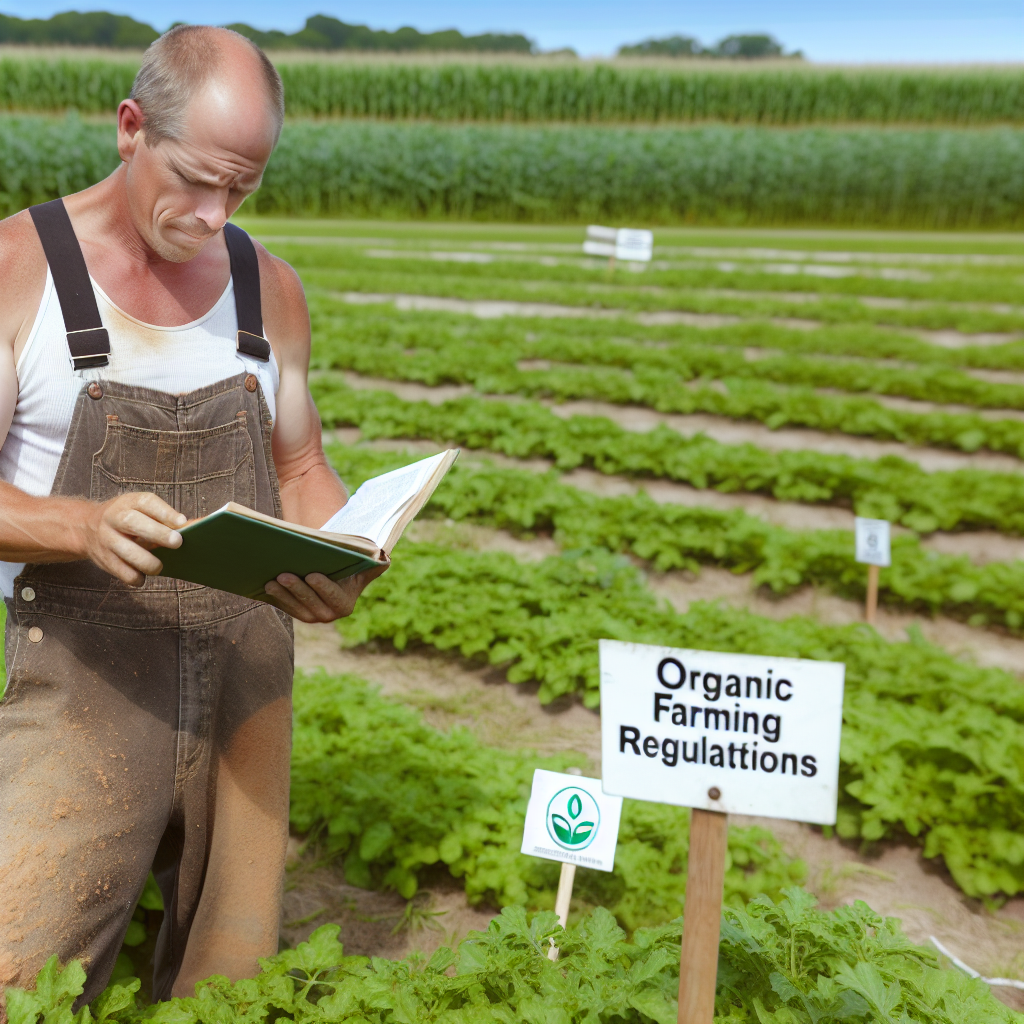Introduction to Organic Farming Regulations
Organic farming regulations ensure farmers adhere to specific guidelines.
These guidelines promote environmental sustainability and health-conscious practices.
The National Organic Program (NOP) oversees organic certification in the United States.
Farmers must meet stringent requirements to obtain organic certification.
This process begins with a comprehensive application detailing farming practices.
Overview of Certification Processes
Certification involves multiple steps to verify compliance with regulations.
Firstly, farmers must develop an Organic System Plan (OSP).
This plan outlines production methods and compliance measures.
Next, an accredited certifying agent reviews the OSP.
Upon approval, farmers can begin implementing organic practices.
Key Regulations in Organic Farming
Organic regulations focus on soil management and pest control.
Farmers must use organic seeds and maintain detailed records.
They cannot use synthetic pesticides or fertilizers.
Additionally, organic livestock must receive organic feed and have access to outdoor spaces.
Understanding Compliance Standards
Compliance standards vary across different regions and products.
Transform Your Agribusiness
Unlock your farm's potential with expert advice tailored to your needs. Get actionable steps that drive real results.
Get StartedFarmers must stay informed about local regulations.
This ensures their practices align with certification requirements.
Regular inspections by certifying agents help maintain compliance.
Challenges Faced by Organic Farmers
Organic farmers encounter several challenges in maintaining certification.
Common challenges include pest management and market competition.
Moreover, maintaining detailed records can be time-consuming.
Farmers often need to invest in training and resources to comply.
The Future of Organic Farming Regulations
As demand for organic products grows, regulations may evolve.
Future changes could focus on improving accessibility for small farmers.
Technological advancements may also play a role in compliance efforts.
Farmers can benefit from ongoing education and support programs.
Historical Context of Organic Farming Standards
Early Beginnings of Organic Farming
Organic farming roots trace back to ancient agricultural practices.
Farmers originally utilized natural methods for soil enrichment.
They relied on crop rotation and green manure to improve fertility.
These techniques fostered a sustainable relationship with the land.
The Rise of Organic Movements
In the early 20th century, organic movements began to take shape.
Pioneers like Sir Albert Howard advocated for holistic farming approaches.
They emphasized the importance of natural processes in agriculture.
These ideas gained traction amidst the industrial revolution’s impact.
Formation of Official Standards
The 1970s marked a significant turning point for organic farming.
Consumer demand for organic products began to grow significantly.
In response, the first organic certification programs emerged.
Organizations like the California Certified Organic Farmers played crucial roles.
Legislation and Regulation Development
In the 1990s, national interest in organic farming increased.
Showcase Your Farming Business
Publish your professional farming services profile on our blog for a one-time fee of $200 and reach a dedicated audience of farmers and agribusiness owners.
Publish Your ProfileLegislation aimed to standardize organic practices across the United States came into focus.
The Organic Foods Production Act of 1990 established regulations for organic certification.
This law paved the way for the National Organic Program in 2000.
Global Influence on Organic Standards
Organic farming regulations became a global issue over time.
International bodies, such as the International Federation of Organic Agriculture Movements, set standards.
These standards facilitate global trade in organic products.
Diverse countries developed their unique organic certification processes.
Current Landscape of Organic Regulations
Today, organic farming standards continue to evolve globally.
Governments and private organizations work to refine certification processes.
The focus remains on sustainability, quality, and consumer trust.
Adhering to these regulations ensures the integrity of organic products.
Key Organizations Involved in Organic Certification
United States Department of Agriculture
The United States Department of Agriculture (USDA) sets the national standards for organic farming.
They oversee the National Organic Program (NOP), which regulates organic certification.
Moreover, the USDA facilitates organic standards development and enforcement.
Organic Trade Association
The Organic Trade Association (OTA) advocates for organic agriculture and products.
They provide educational resources and networking opportunities for organic stakeholders.
Additionally, OTA engages in policy work advocating for organic farmers and businesses.
Certification Organizations
Various certification organizations play a crucial role in organic farming.
These include independent entities such as Oregon Tilth, CCOF, and Quality Assurance International.
Each organization tests and verifies compliance with organic standards.
Furthermore, they conduct inspections of farms and processing facilities annually.
International Federation of Organic Agriculture Movements
The International Federation of Organic Agriculture Movements (IFOAM) promotes organic agriculture worldwide.
They establish global organic standards and encourage sustainability practices.
IFOAM also supports organic farmers through training and resource sharing.
State Departments of Agriculture
Each U.S. state has its own Department of Agriculture that supports local organic farmers.
These departments often assist in the certification process at a state level.
They help by providing information on local regulations and organic standards.
Moreover, state departments may offer grant programs for organic farmers.
Find Out More: Essential Steps for Farmers to Apply for Research and Development Grants
Overview of National Organic Program Guidelines
Purpose of the National Organic Program
The National Organic Program (NOP) establishes national standards for organic agriculture.
It is designed to protect consumer interests and ensure integrity in organic labeling.
Additionally, it supports farmers and producers who engage in organic practices.
Key Regulations Under NOP
The NOP outlines specific regulations that must be followed to qualify for organic certification.
First, farms must maintain their organic integrity for three years before certification.
Next, they must adhere to strict guidelines regarding soil quality and pest management.
Furthermore, synthetic fertilizers and pesticides are generally prohibited.
Certification Process
Producers seeking organic certification must apply through an accredited certifying agent.
The agent will conduct an inspection to ensure compliance with NOP standards.
Additionally, applicants must develop an Organic System Plan detailing their practices.
This plan includes information on soil management, pest control, and record-keeping.
Showcase Your Farming Business
Publish your professional farming services profile on our blog for a one-time fee of $200 and reach a dedicated audience of farmers and agribusiness owners.
Publish Your ProfileLabeling Requirements
Organic products must meet specific labeling requirements to inform consumers accurately.
Products labeled as “100% Organic” contain only organic ingredients.
Those labeled “Organic” must contain at least 95% organic ingredients.
Meanwhile, “Made with Organic Ingredients” must include at least 70% organic content.
Compliance and Enforcement
The USDA monitors compliance with the NOP through inspections and reviews.
Any violations can lead to penalties, including loss of certification.
Moreover, complaints from consumers or competitors can trigger investigations.
Importance of Organic Standards
Organic standards are essential for consumer trust in food products.
They promote environmentally sustainable agricultural practices.
By maintaining these standards, the NOP supports global efforts for healthier food systems.
Find Out More: Understanding Farm-To-Table Legislation: A Comprehensive Guide for Farmers
Differences Between Domestic and International Organic Standards
Understanding Domestic Standards
Domestic organic standards vary by country.
In the United States, the USDA sets specific regulations.
These regulations define what constitutes organic farming.
USDA-certified farms must meet these strict guidelines.
Additionally, domestic standards require annual inspections.
International Standards Overview
International organic standards also differ significantly.
The International Federation of Organic Agriculture Movements (IFOAM) provides global guidelines.
These guidelines can vary based on local practices.
For example, EU regulations may differ from those in Canada.
Labeling and Certification Requirements
Labeling procedures are crucial to organic standards.
In the U.S., products labeled “organic” must comply with USDA regulations.
Conversely, EU standards have their own labeling criteria.
Each region sets its own rules for certification bodies.
Trade and Import Regulations
Trade regulations impact the organic market significantly.
Different countries have varying import requirements for organic products.
Many countries require additional certifications for imported goods.
Moreover, organic food may face tariffs depending on the origin.
Consumer Awareness and Market Trends
Consumer awareness affects the demand for organic products.
In many countries, consumers prefer locally sourced organic goods.
This preference influences domestic production practices.
International market trends also sway domestic consumer choices.
Environmental Impact Considerations
Biodiversity plays a role in both domestic and international standards.
Regulations encourage sustainable practices to protect ecosystems.
Farms that meet organic standards promote soil health and natural habitats.
Moreover, these practices contribute to climate change mitigation efforts.
Gain More Insights: Key Sources of Research and Development Funding for Agricultural Businesses
The Role of Third-Party Certifiers in Organic Farming
Understanding Certification
Third-party certifiers validate organic farming practices.
They ensure compliance with established regulations.
Certification enhances the credibility of organic products.
Showcase Your Farming Business
Publish your professional farming services profile on our blog for a one-time fee of $200 and reach a dedicated audience of farmers and agribusiness owners.
Publish Your ProfileThe Certification Process
The certification process involves several steps.
First, farmers must apply for certification.
Next, certifiers conduct an on-site inspection.
This inspection assesses farming practices and inputs used.
After the inspection, the certifiers review all documentation.
Finally, they issue a certification decision based on compliance.
Benefits of Third-Party Certification
Third-party certification provides numerous benefits to farmers.
It increases market access for certified products.
Farmers can potentially earn higher prices for organic goods.
Moreover, certification builds consumer trust in the products.
Challenges Faced by Certifiers
Certifiers face unique challenges in their role.
Ensuring compliance can be resource-intensive.
They must stay updated with changing regulations.
Additionally, certifiers need to manage diverse farming methods.
Choosing a Certifying Agency
Selecting the right certifying agency is crucial.
Farmers should consider agency reputation and experience.
Understanding specific requirements can aid in the decision.
Moreover, farmers should evaluate the agency’s accessibility.
Maintaining Certification
Maintaining certification requires ongoing diligence.
Farmers must consistently follow organic practices.
Regular record-keeping is essential for compliance.
Annual inspections ensure continued adherence to regulations.
Discover More: How Government Policies Influence Agricultural Insurance

Compliance Requirements for Organic Farmers
Understanding Organic Certification
Organic certification is essential for organic farmers.
It ensures that their products meet specific agricultural standards.
Farmers must apply through a certifying agent.
This agent assesses the farm’s practices and products.
Maintain Detailed Records
Record-keeping is a crucial aspect of compliance.
Farmers should document all inputs and practices.
This includes seed sources, pest management, and soil amendments.
Maintain records for at least three years.
Types of Records to Keep
- Planting dates and crop varieties
- Pest and disease management practices
- Fertilizer and input application dates
- Sales and income records
Follow Crop Rotation Practices
Crop rotation is vital for sustainable organic farming.
This practice enhances soil health and prevents pest buildup.
Farmers must plan their rotations carefully each season.
It helps maintain nutrient levels in the soil.
Implement Organic Pest Management
Organic farmers must utilize natural pest control methods.
They should avoid synthetic pesticides entirely.
Effective pest management includes biological controls and traps.
Regular monitoring will help identify pest issues early.
Comply with Organic Labeling Standards
Accurate labeling is essential for organic products.
Showcase Your Farming Business
Publish your professional farming services profile on our blog for a one-time fee of $200 and reach a dedicated audience of farmers and agribusiness owners.
Publish Your ProfileLabels must clearly state the organic status.
Farmers should understand different labeling categories.
This includes terms like “100% Organic” and “Organic.”
Label Requirements
- Use the USDA organic seal, if applicable
- Include the certifying agent’s name
- Clearly state the percentage of organic content
Attend Required Education and Training
Organic farmers should participate in ongoing education.
This helps them stay informed about best practices.
Workshops, conferences, and online courses are valuable.
Knowledge of regulations is crucial for compliance.
Undergo Regular Inspections
Regular inspections are part of the organic certification process.
Farmers should prepare for these inspections annually.
Inspections evaluate farm practices and record accuracy.
Compliance during inspections is crucial for maintaining certification.
Enforcement and Penalties for Non-Compliance
Regulatory Oversight
Regulatory bodies enforce organic farming regulations effectively.
They conduct regular inspections on certified farms.
These inspections ensure compliance with established standards.
Furthermore, officials evaluate record-keeping practices.
They also assess farming inputs and production methods.
Non-compliant practices raise red flags for further investigation.
Consequences of Non-Compliance
Farmers face serious repercussions for non-compliance.
Regulatory authorities might impose fines as penalties.
In severe cases, they can suspend organic certification.
This suspension prevents farmers from marketing their products as organic.
Additionally, repeated violations could lead to permanent revocation.
Many growers may also lose consumer trust after violations.
Appeals Process
Producers have the right to appeal enforcement actions.
This process ensures fairness in addressing compliance issues.
Farmers can present evidence and argue their case.
Ultimately, regulators review the appeals thoroughly.
They consider the merits of each case before making decisions.
Educational Efforts
Regulatory agencies promote education among farmers.
They provide resources on organic farming standards and practices.
Workshops and training sessions help farmers understand compliance.
Additionally, online resources keep producers informed of changes.
Many organizations offer guidance on maintaining certification.
These initiatives aim to reduce the risk of non-compliance.
The Future of Organic Farming Regulations
Emerging Trends
Organic farming is experiencing rapid growth worldwide.
Consumers are increasingly demanding organic products.
This demand drives new regulations and standards.
Moreover, technological advancements influence organic practices.
Farmers adopt innovative techniques to enhance yields.
As a result, regulatory bodies adapt to these changes.
Showcase Your Farming Business
Publish your professional farming services profile on our blog for a one-time fee of $200 and reach a dedicated audience of farmers and agribusiness owners.
Publish Your ProfileIncreased Regulatory Scrutiny
Regulatory agencies will likely tighten enforcement of organic standards.
Increased inspections may become more commonplace.
Compliance will require farms to maintain detailed records.
Transparency initiatives will also grow in importance.
Consumers desire assurance about organic claims.
Sustainability as a Driving Force
Sustainability will play an essential role in shaping regulations.
Farmers will prioritize practices that enhance environmental health.
Soil health and water conservation will gain attention.
Long-term sustainability will drive policy changes.
These adjustments will reflect a growing awareness of climate impacts.
Technological Integration
Technology will increasingly influence organic farming regulations.
Precision agriculture tools will help farmers optimize their practices.
Remote sensing technology will aid in monitoring compliance.
Data analytics can enhance management decisions and regulatory adherence.
Furthermore, blockchain technology may ensure traceability in supply chains.
Global Harmonization of Standards
Global trade patterns will affect organic farming regulations.
Countries will likely work toward harmonizing organic standards.
This approach can simplify international trade for organic products.
Moreover, collaborative efforts may emerge to establish consistent practices.
Such initiatives will help brands navigate diverse markets more effectively.
Future Policy Directions
Governments may introduce policies that incentivize organic farming.
Financial assistance for transition periods may become available.
Educational programs will support farmer engagement with new regulations.
These initiatives will aim to foster a more robust organic sector.
Ultimately, regulations will reflect evolving consumer expectations and values.
Additional Resources
Organic 101: What the USDA Organic Label Means | Home
What is the Farm Bill? – National Sustainable Agriculture Coalition




